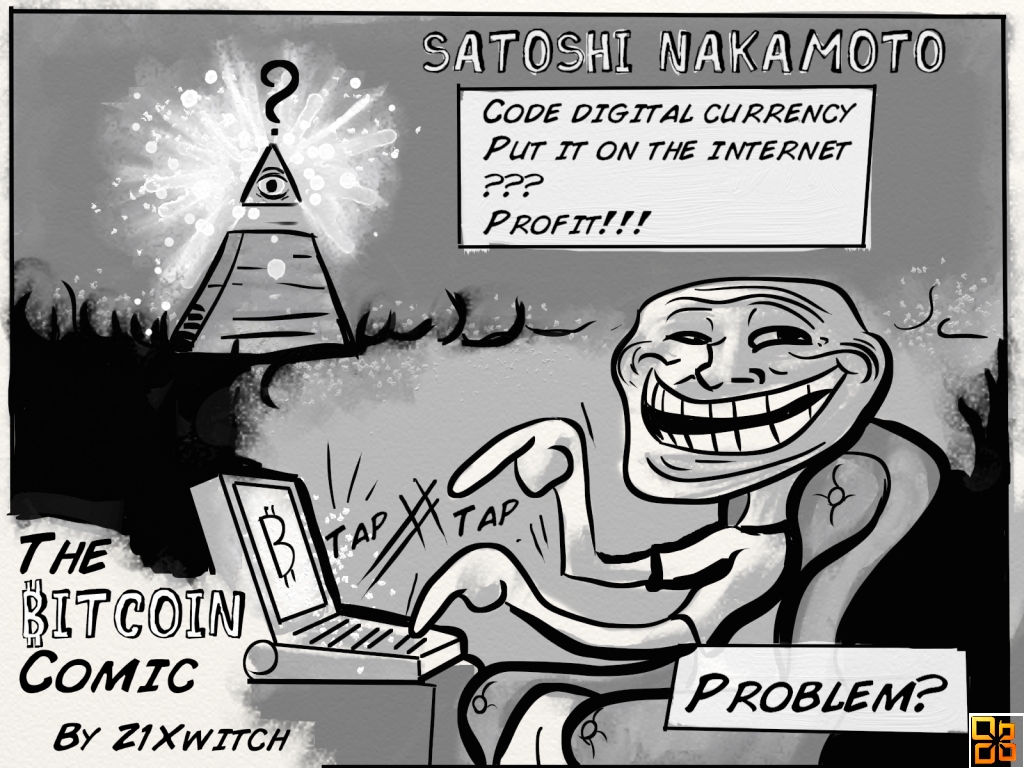Bit O’Money: Who’s Behind the Bitcoin Bubble?

Satoshi Nakamoto is the pseudonymous creator of Bitcoin. (Comic: Rasmus Rasmussen, Z1Xwitch ArtWork)
It was a tweet from a stranger that crystallized the concept of Bitcoin for Bruce Wagner. “I can explain the benefit of Bitcoin in four words,” one of Mr. Wagner’s 12,000-some Twitter followers wrote. “Briefcases full of cash.” At the time, briefcases full of pennies seemed more apt—one unit of the new virtual currency was then worth $0.06. Then, in one day, the price of a Bitcoin jumped to $0.22. Mr. Wagner, a former I.T. specialist who now produces and stars in his own web TV shows, became obsessed with the things. He sat at his computer, too excited to eat, reading the myriad white papers, trade blogs, technical analyses and forum discussions about Bitcoin. For five days, he hardly slept. He just kept thinking, This is amazing. This is going to change everything. The last time he’d been this excited was when Windows came out. He got his hands on some Bitcoins and sold when the price doubled. It kept climbing. He invested more. Bitcoin is Internet gold, a digital currency developed by a community of programmers in 2009 that represents the first plausible manifestation of an unregulated global “cryptocurrency” first imagined by anarchist computer hackers in the late 90’s. Bitcoins are snippets of code that use encryption to prevent counterfeiting and double-spending. Complex algorithms control the money supply, in theory replacing the need for banks or a central regulator. Right now Bitcoins can be generated—or “mined”—by running a program on a powerful computer. This task requires exponentially more time and processing power as the number of Bitcoins grows, and the absolute number of Bitcoins is capped at 21 million, mimicking the scarcity of gold. There are now 6,539,450 in circulation; $2 million worth were traded on the main Bitcoin exchange Mt. Gox on Friday. The price of a Bitcoin climbed slowly but steadily until May, when Gawker and the tech blog Launch published two big stories about the phenomenon. Prices started zigzagging up, hitting a high of $33.11 last week after three weeks of increasingly frenzied trading, and then fell a spectacular 30 percent Friday morning, what the blogs dubbed “Digital Black Friday.” As of now—3 p.m. Tuesday—a Bitcoin can be had for around $18. As with gold, the number of things one can purchase with Bitcoin is limited. There are 64 listings on BitGigs.com, a recently launched job board for buyers and sellers who want to do business in Bitcoins, and a few dozen more on Bitcoinclassifieds.net. Some programmers in New York created an app for Android phones that allows users to trade Bitcoins on the spot. A few start-ups have listed on the Global Bitcoin Stock Exchange, an experimental market for bonds and private companies. There are websites that allow you to purchase ground coffee or alpaca socks with Bitcoin. Meze Grill on 55th Street and Eighth Avenue, “where authentic Mediterranean food meets modern flavor,” accepts Bitcoin, as does the Fetish Fortress, a bondage dungeon in Chinatown. Bitcoin appeals primarily to computer geeks, who love it for its technical elegance. It has also found fans among libertarians and populists, because it circumvents banks and governing authorities; digital natives, because it simplifies peer-to-peer payments; and law-breakers of various kinds, because transactions are untaxed and difficult to trace. Most of the activity around Bitcoin right now is pure speculation, however, due to the violent price fluctuations and limited adoption by merchants. The Wall Street Journal’s SmartMoney blog trumpeted “The Currency That’s Up 200,000%.” One German coder who frequents Bitcoin forums claims investors gave him $500,000 to build a data center to mine Bitcoins; a programmer posting on Reddit emptied his bank account and maxed out his credit cards in March to buy $10,000 worth of mining equipment. (“Within three months of finding Bitcoins,” he wrote, “it has completely consumed my entire life, all of my ‘money,’ and I am loving every minute of it.”) One college student sustained permanent minor brain damage due to heatstroke after he dozed off in his room next to four computers furiously mining Bitcoins. “I wish I was joking,” he said in a forum post that was reposted on the website BitcoinMiningAccidents.com. Rick Falkvinge, founder of the Swedish Pirate Party, declared he was putting all his savings into Bitcoin. [Web bonus! Check out this video of an exhaust system built for a Bitcoin mining rig.] According to Larry White, an economics professor at George Mason University who specializes in monetary theory and banking, Bitcoin is essentially “a floating exchange rate against other currencies.” He added with some amusement, “It does seem to have some purchasing power, or at least some expectation of having some purchasing power, and so it seems to have lifted itself by its own bootstraps into having a positive value.” Bitcoin enthusiasts believe the currency will rival the dollar, so the fact that the ultimate supply is fixed makes it a sure bet. Dr. White isn’t so sure. The currency simply doesn’t offer enough advantages over traditional currencies to compel the average person to switch. “I’m having trouble figuring out the practical business case for it going mainstream,” he said, “unless the U.S. dollar becomes much more unstable.” Sounds plausible to us! Under that scenario, if Bitcoin were able to present a more stable alternative, the cryptocurrency would be “healthy competition for the dollar,” Dr. White said, adding, “This is, by the way, the same thing I said about the Liberty Dollar.” The Liberty Dollar was a private currency minted in Idaho and used by at most a quarter million people between 2007 and 2009, during which time its value doubled in relation to silver. It came to an ignominious end when the federal government arrested its creator, among others, and declared the operation a federal crime. E-gold, a digital currency backed by real gold, met a similar fate when the U.S. Department of Justice charged its creators with money-laundering. As for Bitcoin, Senator Chuck Schumer began agitating for a crackdown on the currency after it was used to buy various illegal drugs on the underground website Silk Road. A Bitcoin ban would be tough to enforce for the same reasons music piracy has been impossible to stamp out. But the government has enough tools at its disposal to prevent Bitcoin from becoming mainstream, Dr. White says. There are also concerns about the currency’s technical integrity due to a story spreading about one Bitcoin investor who says he lost almost half a million dollars’ worth of Bitcoins to a hacker.
Like most nifty ideas that germinate in the tech world, the odds are against Bitcoin ever achieving widespread use. Nevertheless, there are plenty of believers. “It’s only going to take one rich Arab sheik to throw some pocket change at it,” opined Mr. Wagner, who has become an unofficial Bitcoin spokesman after creating a Bitcoin-for-dummies website, Bitcoinme.com. He also hosts The Bitcoin Show, a web TV series on his network; organizes the monthly New York Bitcoin Users Meetup, which has 62 members; and is planning BitCon 2011, the first Bitcoin conference “and world expo,” which will take place in New York in August. He doesn’t give investment advice, he’s careful to say. But he’s bullish. “It’s a bubble, but it’s an unbreakable bubble, one that is just going to keep growing and growing and growing,” he said. He had predicted Bitcoins would be going for $10 each by the end of May; the price hit $9.999 on June 1. He now says it will hit $100 by the end of the month and $10,000 within one year. That nutty-sounding forecasting recalls dot-com bubble boy analyst Henry Blodget’s famous 1998 prediction that Amazon’s pre-split stock would double to $400, which happened less than a month later. (The call earned him a job at Merrill Lynch, but his public cheerleading of tech stocks eventually led to a $2 million fine for securities fraud.) “It’s kind of like the early days of the dot-com,” Mr. Wagner said. “People heard about this thing called the Internet and they didn’t know what it was, didn’t know what to do, so they bought every [stock] that ended in a dot-com and of course they all lost their shirts. This is kind of like this, but you actually can buy a piece of it, like the Internet but you can own a piece of it.” We asked him how many Bitcoins he owned. “That’s like asking me my bank balance,” Mr. Wagner replied. “People have to realize that Bitcoin is money and in America it’s not polite to ask people how much money they have.” By this point in our reporting, Betabeat wanted in. “Can I have one of your Bitcoins?” we pinged a hacker friend we knew had accumulated a nice pile, worth almost two grand at today’s prices. “Hell no. You should have asked me two weeks ago. I was giving them out,” he typed back from a start-up office in San Francisco. “Current plan is to hold out until they are $100 a coin, then sell 20 percent. After that I’ll wait till it hits $1,000 a coin and sell another 70 percent.” “I could have been doing this many years ago, and I would have had a billion dollars!” Alex Spitzer, a Boston-based programmer told us with wry regret. He read about Bitcoin in 2009, but didn’t get into mining until recently. Even so, Mr. Spitzer is mindful of the groupthink that pervades his industry. “The problem with the Internet is that it’s too easy to find people like you—like-minded, high-minded kind of nonsense. The more you read these sites and these forums, the more people will tell you that Bitcoin is, like, the best thing ever.” In fact, hardcore Bitcoin enthusiasts believe the currency could change the world for the better. In some parts of the world, it’s impossible for small businesses to take electronic payments, said Jered Kenna, one of the founders of TradeHill, which launched last week as the first competitor to Bitcoin exchange Mt. Gox. With Bitcoin, businesses can start taking online orders immediately, no bank account, no credit cards, no transaction fees required. Micropayments also become practical, he told Betabeat from the office in Chile where he and his co-founder, Adam Stradling, a New York expat, had been working nonstop through the weekend to keep the site up despite massive trade volumes in the wake of Digital Black Friday. “I grew up a computer nerd and I looked at it from a technical aspect and I said, wow, this could actually work, but the general population just won’t see it,” Mr. Kenna said. “I underestimated people. Then I saw it growing. I said, you know, I could help this, and I could make a lot of money at the same time.” But Bitcoin is an experiment, he said. “Don’t bet the house.”
|



 网友评论
网友评论


 @好耶网络
Processed In:-1.9531-Seconds, CMS-56Queries-Amazon Web Services
@好耶网络
Processed In:-1.9531-Seconds, CMS-56Queries-Amazon Web Services












 您的位置:
您的位置: 【】
【】

 [上两篇]
[上两篇]